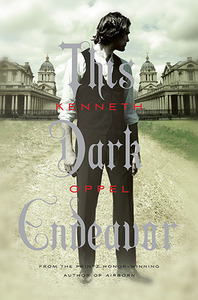You need to sign in or sign up before continuing.
Take a photo of a barcode or cover
Kenneth Oppel has had a special place in my heart since I was a kid, when his bat-tastic Silverwing series swooped into my life and made my oddball ass feel less alone. So, years ago, when I spotted a Frankenstein prequel by Kenneth Oppel, I was quick to snatch it up, but the book languished on my TBR shelf the last few years as more pressing titles jumped the queue. I finally found the time to pick it up, and to say I was disappointed would have been an understatement. This Dark Endevour is DULL. It's predictable. It's more than forgettable, it's why-bother-reading-able. The book's greatest weakness is that it's a Frankenstein prequel; its saving grace the target audience, who likely have not read the original Frankenstein and can't compare Oppel's changes to the original text. Yet even then, the book falls flat: the story is uninspired, the romantic and plot twists are contrived, lacking any sense of stakes, and the characters feel ripped out of the wrong time period.
Slapping Frankenstein on this book leads to natural comparisons between the texts, but ironically, knowing the basics of Frankenstein makes the plot and twist ending of This Dark Endevour painfully obvious. Oppel introduces readers to his Frankenstein twins: Victor Frankenstein, the savant scientist that science-fiction knows all too well, and Oppel's creation, Konrad - the virtuous mirror-inversion of Victor, whose flaws have been bent backwards into much a nobler configuration. Konrad is sweet, he's compassionate, he's sensitive and gentle, but also brave, just, and level-headed - often the voice of reason, reigning Victor in when his lofty ideals pull them off the moral path. Yet this inversion of Victor's traits also reveals that Oppel either dislikes or doesn't understand the nuance within Shelley's Victor Frankenstein, as Oppel emphasizes Victor's negative traits - greed, ambition, stubbornness, solipsism - and crafts Konrad as the opposite of that, making both characters feel partly artificial and casting them in 'angel' and 'devil' roles. In the original text, Victor spent much of his time reigning himself back in, and the balance between doing wrong and trying to correct course is what made him so fascinating. Oppel's Victor feels more akin to the mad-scientist representations of Victor Frankenstein that pop-culture is more familiar with.
Early in the book, Konrad falls deathly ill, motivating Victor and his friends Elizabeth and Henry to seek out alchemic knowledge that would lead them to the Elixir of Life to safe Konrad's life. At this point, the fact that this is a Frankenstein tale immediately gave away the ending. This is, after all, Victor Frankenstein, the man known for bringing back the dead, not for saving the living, so before I'd even opened the book (as Konrad's illness is spelled out on the back cover), it was painfully obvious that despite all efforts, Konrad wasn't going to make it. Oppel tries to combat this by drawing out the tension of Konrad's illness and faking out the reader in regards to his recovery, but the efforts fall painfully flat.
The overall plot is organized around a three-point fetch quest that quickly became predictable and dull. Victor and his friends connect with an alchemist who tasks them with collecting the three ingredients needed to save Konrad, and holy crap was this boring. No amount of cool glow-in-the-dark moss, demon fish, or wolf's eye alchemy could distract from the terrifyingly predictable arcs of find thing - attacked by monsters - barely escape with item. This formula repeats again at the finale as trusted characters turn on each other and the actual creation of the Elixir becomes yet another fetch mission. The story could have worked if it was in a video game, where the agency of players could have mitigated some of the boredom from the plot's predictability. Instead, the reader is dragged along, beat by expected beat, without anything to change up the formula.
Finally, the characters. As I already mentioned, Victor and Konrad are two-dimensional representations of the "good" and "bad" twin, although thankfully this becomes less pronounced as Konrad becomes bedridden and less of an active character. Elizabeth was also difficult to stomach through much of the text. Many times, she asserts her equality to the boys by declaring that she's braver, stronger, and more tenacious than others (certainly Henry). The characters often have a "Don't You Know, Bob?" moment where they recount when Elizabeth bested the boys, was braver than them, or, GASP - wore trousers. These conversations feel so contrived, like Elizabeth is arguing against someone that isn't even there, asserting her autonomy and independence when no one was questioning it (other characters, narrative, even audience). I can't help but wonder why Oppel felt the need to assure audiences of Elizabeth's Girl Power! and can only assume it's because of the time period the book is set in. Finally, Oppel establishes an interesting romantic conflict between Victor, Elizabeth, and Konrad, but introduces this too late (so it feels like it comes out of nowhere, when this romantic tension could and should have been underlying their interactions from the beginning). This tension also doesn't lead to much besides some simmering resentment and moments of will-they-won't-they. I wish this romantic tension was better defined, upped the stakes, and actually lead to consequences in their relationship. It would have been nice to see that simmering resentment actually pitch up to a boil.
All in all, this book isn't worth the read. Even as a fun, dumb pulp read, there's nothing really fun about it. With how predictable the whole plotline was, it would have been smarter to start the plot at book 2, where Konrad is already dead and build to how Victor plans to bring him back, even if that would have had its own complications. That concept at least has some creative possibilities within in, but this book left such a bad taste in my mouth that I don't care to see where Oppel takes this concept. It's dead in the water if you ask me, and not worth the lightning for its resurrection.
2/5 stars. Boring and uninspired.
Slapping Frankenstein on this book leads to natural comparisons between the texts, but ironically, knowing the basics of Frankenstein makes the plot and twist ending of This Dark Endevour painfully obvious. Oppel introduces readers to his Frankenstein twins: Victor Frankenstein, the savant scientist that science-fiction knows all too well, and Oppel's creation, Konrad - the virtuous mirror-inversion of Victor, whose flaws have been bent backwards into much a nobler configuration. Konrad is sweet, he's compassionate, he's sensitive and gentle, but also brave, just, and level-headed - often the voice of reason, reigning Victor in when his lofty ideals pull them off the moral path. Yet this inversion of Victor's traits also reveals that Oppel either dislikes or doesn't understand the nuance within Shelley's Victor Frankenstein, as Oppel emphasizes Victor's negative traits - greed, ambition, stubbornness, solipsism - and crafts Konrad as the opposite of that, making both characters feel partly artificial and casting them in 'angel' and 'devil' roles. In the original text, Victor spent much of his time reigning himself back in, and the balance between doing wrong and trying to correct course is what made him so fascinating. Oppel's Victor feels more akin to the mad-scientist representations of Victor Frankenstein that pop-culture is more familiar with.
Early in the book, Konrad falls deathly ill, motivating Victor and his friends Elizabeth and Henry to seek out alchemic knowledge that would lead them to the Elixir of Life to safe Konrad's life. At this point, the fact that this is a Frankenstein tale immediately gave away the ending. This is, after all, Victor Frankenstein, the man known for bringing back the dead, not for saving the living, so before I'd even opened the book (as Konrad's illness is spelled out on the back cover), it was painfully obvious that despite all efforts, Konrad wasn't going to make it. Oppel tries to combat this by drawing out the tension of Konrad's illness and faking out the reader in regards to his recovery, but the efforts fall painfully flat.
The overall plot is organized around a three-point fetch quest that quickly became predictable and dull. Victor and his friends connect with an alchemist who tasks them with collecting the three ingredients needed to save Konrad, and holy crap was this boring. No amount of cool glow-in-the-dark moss, demon fish, or wolf's eye alchemy could distract from the terrifyingly predictable arcs of find thing - attacked by monsters - barely escape with item. This formula repeats again at the finale as trusted characters turn on each other and the actual creation of the Elixir becomes yet another fetch mission. The story could have worked if it was in a video game, where the agency of players could have mitigated some of the boredom from the plot's predictability. Instead, the reader is dragged along, beat by expected beat, without anything to change up the formula.
Finally, the characters. As I already mentioned, Victor and Konrad are two-dimensional representations of the "good" and "bad" twin, although thankfully this becomes less pronounced as Konrad becomes bedridden and less of an active character. Elizabeth was also difficult to stomach through much of the text. Many times, she asserts her equality to the boys by declaring that she's braver, stronger, and more tenacious than others (certainly Henry). The characters often have a "Don't You Know, Bob?" moment where they recount when Elizabeth bested the boys, was braver than them, or, GASP - wore trousers. These conversations feel so contrived, like Elizabeth is arguing against someone that isn't even there, asserting her autonomy and independence when no one was questioning it (other characters, narrative, even audience). I can't help but wonder why Oppel felt the need to assure audiences of Elizabeth's Girl Power! and can only assume it's because of the time period the book is set in. Finally, Oppel establishes an interesting romantic conflict between Victor, Elizabeth, and Konrad, but introduces this too late (so it feels like it comes out of nowhere, when this romantic tension could and should have been underlying their interactions from the beginning). This tension also doesn't lead to much besides some simmering resentment and moments of will-they-won't-they. I wish this romantic tension was better defined, upped the stakes, and actually lead to consequences in their relationship. It would have been nice to see that simmering resentment actually pitch up to a boil.
All in all, this book isn't worth the read. Even as a fun, dumb pulp read, there's nothing really fun about it. With how predictable the whole plotline was, it would have been smarter to start the plot at book 2, where Konrad is already dead and build to how Victor plans to bring him back, even if that would have had its own complications. That concept at least has some creative possibilities within in, but this book left such a bad taste in my mouth that I don't care to see where Oppel takes this concept. It's dead in the water if you ask me, and not worth the lightning for its resurrection.
2/5 stars. Boring and uninspired.
There is a dark cave. There are dangerous creatures about to pounce. There is greed and obsession and sneaking around. There is a grisly amputation. There is the burgeoning interest in medicine and magic that makes you go, yeah, I believe this kid could turn into a mad scientist. It has all the markings of a so-so horror story.
What I know of Frankenstein comes from the Universal films, Mel Brooks’ Young Frankenstein, and the Danny Boyle theatre adaptation. (Sorry Mary Shelley.) Compared to those adaptations, Ken Oppel has done a good job of keeping the bones of the story while making this interpretation entirely his own.
What gives this book an extra star is the super creepy way the author deals with twins. Victor and Konrad are best friends. When Konrad’s health fails, Victor will do ANYTHING to make him well again. When Konrad keeps a secret his love for their cousin Elizabeth (EWWW), Victor rages with jealousy and competition.
Victor is impulsive, he’s headstrong, he’s naïve. He makes some stupid decisions and just narrowly avoids doing something VERY, VERY BAD. At points, it was extremely uncomfortable to be in this kid’s head, and that is exactly how a good horror story should go.
What I know of Frankenstein comes from the Universal films, Mel Brooks’ Young Frankenstein, and the Danny Boyle theatre adaptation. (Sorry Mary Shelley.) Compared to those adaptations, Ken Oppel has done a good job of keeping the bones of the story while making this interpretation entirely his own.
What gives this book an extra star is the super creepy way the author deals with twins. Victor and Konrad are best friends. When Konrad’s health fails, Victor will do ANYTHING to make him well again. When Konrad keeps a secret his love for their cousin Elizabeth (EWWW), Victor rages with jealousy and competition.
Victor is impulsive, he’s headstrong, he’s naïve. He makes some stupid decisions and just narrowly avoids doing something VERY, VERY BAD. At points, it was extremely uncomfortable to be in this kid’s head, and that is exactly how a good horror story should go.
Somewhat spoiler alert.
NO BOOK HAS EVER MADE ME SO MAD. IT WAS SO GOOD. THEN IT TURNED AWFUL.
NO BOOK HAS EVER MADE ME SO MAD. IT WAS SO GOOD. THEN IT TURNED AWFUL.
I gave this book three stars because I did enjoy it despite my complaints. The main character, Victor Frankenstein is a typical angsty sixteen year old with a one dimensional personality. He lives in the shadow of his slightly older but seemingly perfecy twin brother who has everything he wants. Like I said, typical. He is in love with a girl who loves his brother and the seemingly endless love triangles that take place in YA books are strong in this book. The world built around Victor is quite vauge and doesnt have the grit of reality that I tend to enjoy. The characters are easily understandable and quite forgettable. Victor, the angsty teen with brother issues who loves Elizabeth. Elizabeth, the fiery childhood friend of the boys who loves Konrad. Konrad, the uninteresting perfect twin who loves Elizabeth. Henry, the sidekick with a minimal personality and a couple of pity traits. Despite the lack of character growth and seemingly shallow plot, I did enjoy this book. The adventure was solid and I grew to and enjoy the dialogue and style of writing. Despite my obvious grievances I may continue on with the series.
Not too bad. It is short, but not abrupt if you've read Frankenstein. I thought it did a good job of making Victor human, even sympathetic-something lacking in the canon Victor. My biggest complaint was with Elizabeth. She was quite out if character, more like the author wished her to be, I think-or more like Mary Shelley. It's not a big deal, as Elizabeth has little character depth in the original story, and most readers will find this younger, fiercer version more interesting.
slow-paced
adventurous
challenging
dark
emotional
hopeful
mysterious
sad
tense
fast-paced
Plot or Character Driven:
A mix
Strong character development:
Yes
Loveable characters:
Yes
Diverse cast of characters:
No
Flaws of characters a main focus:
Yes
The book is a very interesting take on Victor Frankenstein in his early years.







